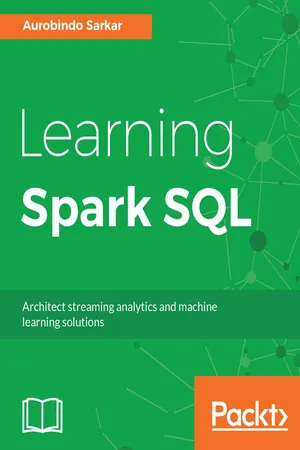
Learning Spark SQL
Aurobindo Sarkar
- 452 Seiten
- English
- ePUB (handyfreundlich)
- Über iOS und Android verfügbar
Learning Spark SQL
Aurobindo Sarkar
Über dieses Buch
Design, implement, and deliver successful streaming applications, machine learning pipelines and graph applications using Spark SQL APIAbout This Book• Learn about the design and implementation of streaming applications, machine learning pipelines, deep learning, and large-scale graph processing applications using Spark SQL APIs and Scala.• Learn data exploration, data munging, and how to process structured and semi-structured data using real-world datasets and gain hands-on exposure to the issues and challenges of working with noisy and "dirty" real-world data.• Understand design considerations for scalability and performance in web-scale Spark application architectures.Who This Book Is ForIf you are a developer, engineer, or an architect and want to learn how to use Apache Spark in a web-scale project, then this is the book for you. It is assumed that you have prior knowledge of SQL querying. A basic programming knowledge with Scala, Java, R, or Python is all you need to get started with this book.What You Will Learn• Familiarize yourself with Spark SQL programming, including working with DataFrame/Dataset API and SQL• Perform a series of hands-on exercises with different types of data sources, including CSV, JSON, Avro, MySQL, and MongoDB• Perform data quality checks, data visualization, and basic statistical analysis tasks• Perform data munging tasks on publically available datasets• Learn how to use Spark SQL and Apache Kafka to build streaming applications• Learn key performance-tuning tips and tricks in Spark SQL applications• Learn key architectural components and patterns in large-scale Spark SQL applicationsIn DetailIn the past year, Apache Spark has been increasingly adopted for the development of distributed applications. Spark SQL APIs provide an optimized interface that helps developers build such applications quickly and easily. However, designing web-scale production applications using Spark SQL APIs can be a complex task. Hence, understanding the design and implementation best practices before you start your project will help you avoid these problems.This book gives an insight into the engineering practices used to design and build real-world, Spark-based applications. The book's hands-on examples will give you the required confidence to work on any future projects you encounter in Spark SQL.It starts by familiarizing you with data exploration and data munging tasks using Spark SQL and Scala. Extensive code examples will help you understand the methods used to implement typical use-cases for various types of applications. You will get a walkthrough of the key concepts and terms that are common to streaming, machine learning, and graph applications. You will also learn key performance-tuning details including Cost Based Optimization (Spark 2.2) in Spark SQL applications. Finally, you will move on to learning how such systems are architected and deployed for a successful delivery of your project.Style and approachThis book is a hands-on guide to designing, building, and deploying Spark SQL-centric production applications at scale.
Häufig gestellte Fragen
Information
Using Spark SQL for Data Munging
- What is data munging?
- Explore data munging techniques
- Combine data using joins
- Munging on textual data
- Munging on time-series data
- Dealing with variable length records
- Data preparation for machine learning pipelines
Introducing data munging
- Individual household electric power consumption Dataset: The original source for the Dataset provided by Georges Hebrail, Senior Researcher, EDF R&D, Clamart, France and Alice Berard, TELECOM ParisTech Master of Engineering Internship at EDF R&D, Clamart, France. The Dataset consists of measurements of electric power consumption in one household at one-minute intervals for a period of nearly four years. This Dataset is available for download from the UCI Machine Learning Repository from the following URL:
- Machine Learning based ZZ...